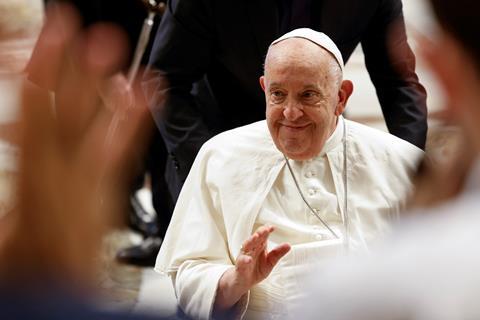In a rare intervention, the Pope has weighed in on the US presidential election, urging American Catholics to “choose the lesser evil”. Rev Peter Crumpler questions the wisdom of church leaders expressing their opinions on foreign elections

Pope Francis has wandered into the minefield of the US Presidential campaign, making negative comments about both candidates.
Even before the weekend’s second assassination attempt on Donald Trump’s life, his remarks were ill-timed and unhelpful.
He described Donald Trump’s promise to deport millions of immigrants as “a grave sin” and criticised Kamala Harris’s pro-choice stance on abortion as amounting to “assassination.”
Speaking to reporters as he flew home from an exhausting twelve day tour of southeast Asia, the pontiff said, “You must choose the lesser evil. Who is the lesser evil? That lady, or that gentleman? I don’t know. Both are against life, be it the one that kicks out migrants or the one that kills children.”
I think it might have been better if he had kept quiet. Why? Because elections are decided by the voters in the country where the election is being held. Only they will decide. They know the country where they live better than anyone – and the impact of the election’s outcome will rest largely on them.
Like many British people I am tempted to think I understand America. I’ve visited numerous times, have American friends, have watched numerous Hollywood movies and binge-watched US TV series. This is a country I think I know. But really, I don’t.
The veteran British journalist and US-watcher Jon Sopel points out “Through music, literature, film and TV, and even through the food we eat and the clothes we wear, we all have a highly developed sense of what America is. We feel we know the country, and through our shared, tangled history we claim a special relationship.” But we are misguided, says Sopel, adding, “If only they didn’t speak English in America, then we’d treat it as a foreign country – and possibly understand it a lot better.”
the United States is a foreign country just as much as Uganda or the Philippines
The United States is a foreign country – and a very significant one on the world stage. Many British Christians are puzzled, outraged perhaps, that their American cousins could vote for Donald Trump in large numbers. Look at the man’s character, his outbursts and his convictions, they say. How could any Christian vote for this man?
And yet, they most likely will. It’s largely thanks to Trump’s position on issues ranging from abortion, trans rights and religious freedom, to identity politics, ‘traditional values’ and standing against what he describes as the US ‘cultural elite’ of journalism and academia. As Chris Goswami commented on Trump’s last term in office, the President “understood the evangelical wish list, and he got it done.”
All this seems a long way from the perspective on Donald Trump and the US election held by many British Christians including, in truth, myself.
From our viewpoint across the Atlantic, many find it hard to line up their Christian values and witness with the opinions and lifestyle demonstrated by the Republican contender for the White House. But maybe we need to admit – and it can be really hard to do this – that the United States is a foreign country just as much as, say, Uganda, the Philippines or Slovakia.
We may think we know the country but, unless we have lived and worked there, we need to have the Christian humility to step back and let our brothers and sisters in that great land work out their own electoral salvation, with fear and trembling.
And yes, even the Pope should not venture an opinion, and leave the Americans to decide on their own President.
All we can do, from overseas, is pray…and remember, In God We Trust.







































1 Reader's comment